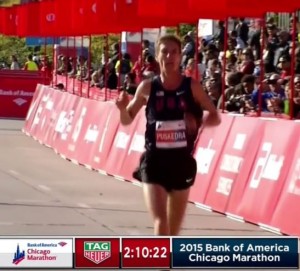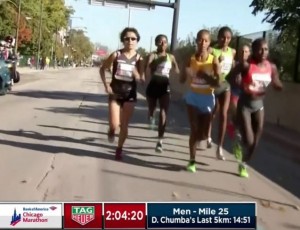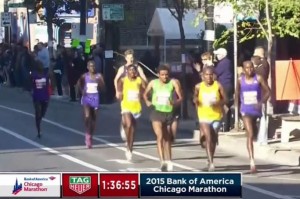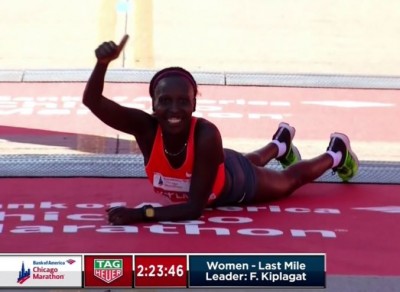2015 Chicago Marathon Recap: Dickson Chumba and Florence Kiplagat Win, Americans Luke Puskedra and Elkanah Kibet Impress, Deena Kastor Gets American Master’s Record
by LetsRun.com
October 11, 2015
For the fourth time in race history, Kenyans swept the men’s and women’s titles at the 2015 Bank of America Chicago Marathon, with Dickson Chumba (2:09:25) and Florence Kiplagat (2:23:33) earning victories on a windy day in the Windy City. Chumba used a 4:35 20th mile to break away with 2014 runner-up Sammy Kitwara and Ethiopian Abera Kuma and three miles later, he accelerated again, dropping first Kuma and then Kitwara before running unchallenged for the final five kilometers to the finish line.
The biggest story from an American perspective, was the performance of 25-year-old American Luke Puskedra, who ran with the lead pack for the majority of the race and wound up an impressive fifth overall in 2:10:24, the fastest time by an American since Meb Keflezighi’s 2:08:37 in Boston last year. The time represented a 5+ minute PB for Puskedra and stamped him as a serious contender for a spot on the US Olympic team at February’s Olympic Trials in Los Angeles. Elkanah Kibet, an American citizen running for the U.S. Army’s World Class Athlete Program, made an early bid for the lead, and though he faded toward the end, still hung on to run 2:11:31 in his debut marathon.
The women’s race came down to a duel between Kiplagat, the half marathon world record holder, and Prague/Houston Marathon champ Yebrgual Melese, who broke away from a lead group of six with just under three miles to go. They ran together for slightly over a mile before Kiplagat dropped Melese to earn her third career Abbott World Marathon Major victory. 42-year-old Deena Kastor finished as the top American in seventh place and broke the US masters record by running 2:27:47, her best time since 2006. Sara Hall’s second career marathon went far better than her first, as she took 10th (second American) in 2:31:14.
For the first time since Carey Pinkowski became race director in 1990, Chicago was run without pacemakers, and though the men’s winning time was slow, the women’s was in line with previous years and both races were exciting.
MB: CHICAGO MARATHON – It’s GO time! – Official Live Discussion Thread
Results and analysis below.
Quick Take #1: Dickson Chumba is a major marathon champion once again; will it be good enough to earn him an Olympic spot?
 Dickson Chumba wins in 2:09:25
Dickson Chumba wins in 2:09:25
Chumba’s not quite in the Eliud Kipchoge/Wilson Kipsang camp, but he’s been remarkably consistent over the past two years and was clearly the best guy in the field today. Last year, he won Tokyo (while setting the course record) and was third in Chicago. This year, he was third in Tokyo and won Chicago. Chumba certainly could have run faster today (he looked to have another gear or two left at the end) but winning is what’s important in this sport and Chumba took care of business.
Now the question becomes whether Chumba can snag an Olympic spot. Kipchoge is a lock for the team and Kipsang has very good odds as well, assuming he runs well in New York next month. But there are a bunch of other contenders, led by world record holder Dennis Kimetto. Chumba has two major wins in two years, but he may need to win again in Tokyo next year to earn the love of the Kenyan selectors. At the very least, a win in Tokyo could make him rich — it would tie him atop the AWMM standings with Kipchoge.
Quick Take #2: What a run from Luke Puskedra
 A Huge Breakthrough For Luke Puskedra
A Huge Breakthrough For Luke Puskedra
Eleven months ago, Puskedra was living on his wife’s farm in South Africa. He was overweight (he gained 23 pounds after his disastrous 2:28 marathon debut in New York in November) and a month later was informed by Nike that his contract would not be renewed for 2015.
“I was in the dumps, trying to figure out what to do with my life,” Puskedra told Runner’s World earlier this week.
He only committed to the race a few weeks ago (After the race, Puskedra had the NBC5 commentators in stitches when he said something along the lines of, “Carey, the race director, has been after me for a while to do the race…I was kind of like the high school girlfriend…Finally I decided that it was right…”)
So how in the world did Puskedra run 2:10:24 today to finish fifth and establish himself as one of the favorites for a spot on next year’s Olympic team?
He started by relocating from Portland, where he had lived while competing as a member of Alberto Salazar’s Nike Oregon Project, to his college stomping grounds of Eugene. Taking guidance from his college coach, Andy Powell, the now unsponsored Puskedra decided to stick with the sport and produced a 2:15:27 at Grandma’s Marathon in June. Since then, Puskedra has gradually gained fitness and after a couple of weeks after finishing fourth at the US 20k Champs on September 7, he decided to enter Chicago.
Though his run at the 20k champs was promising (59:30), very few would have expected a 2:10 out of Puskedra today. Yet when the lead group of 10 broke away between 15k and 20k, the lanky Puskedra went with them and affixed himself to the back of the pack, a 6’4” giant towering over his diminutive foes.
Puskedra ultimately could not respond when Chumba, Kuma and Kitwara broke away during mile 20, but he closed well to take fifth in a massive PB of 2:10:24. Clearly pleased with the performance, Puskedra celebrated with a controlled right-hand fist pump across the finish line.
The Utah native has always had the talent to succeed in the marathon, as shown by his 61:36 half marathon in 2012 while still at Oregon, but that time also created high expectations for Puskedra and he did not respond well to them.
“I felt a lot of pressure at that point,” Puskedra told us Friday. “I had high hopes but it turned more into letting myself down instead of [pushing] myself up.”
Few were expecting anything big from Puskedra in Chicago and he came through brilliantly. The question now is whether he can deliver at the Olympic Trials, when he’ll generate far more attention than he did prior to this race.
When asked after the race about why he almost quit the sport, Puskedra said, “I kind of felt bad that my wife was financially picking up everything. [I thought] it might be time to move on. [Maybe] this is a hobby and maybe it’s a pipe dream to make the Olympics.”
We know one thing. He’s definitely a legitimate Olympic contender, which wasn’t the case a few months ago.
Related: MB: It’s official: Salazar can’t coach the marathon. Puskedra gets dumped by AlSal – runs 18 minute pb!!
One last thing about Puskedra. The lack of rabbits had to have helped him today as he was in the lead pack for much of the race and it made his run all the more enjoyable to watch. Often in the past, Chicago has had pacers for guys looking to run 2:10ish, but they were five minutes behind the leaders and not on television.
Quick Take #3: Is Luke Puskedra the favorite for the third spot on the 2016 US Olympic team?
Assuming they can stay healthy, Meb Keflezighi and Dathan Ritzenhein will be favored to take two of the three spots on next year’s Olympic marathon team. The picture behind them has been muddy for some time, and though nothing will be settled until February 13, Puskedra’s run today certainly shook things up. His time was the best by a non-Meb/non-Ritz American since the 2012 Trials. It’s likely going to take a 2:10-type effort to make the team, and Puskedra is one of a select few who have demonstrated he’s capable of that. Check out the fastest US marathoners since the last Olympic Trials (2:11 or better):
| Name | Time | Race |
| Dathan Ritzenhein | 2:07:47 | 2012 Chicago |
| Meb Keflezighi | 2:08:37 | 2014 Boston |
| Luke Puskedra | 2:10:24 | 2015 Chicago |
| Jeff Eggleston | 2:10:52 | 2014 Gold Coast |
| Ryan Vail | 2:10:57 | 2014 London |
| Bobby Curtis | 2:11:20 | 2014 Chicago |
| Elkanah Kibet | 2:11:31 | 2015 Chicago |
| Fernando Cabada | 2:11:36 | 2014 Berlin |
| Nick Arciniaga | 2:11:47 | 2014 Boston |
It’s foolish to judge marathon runners strictly by time as each race is unique, but running 2:10:24 on a breezy day with no rabbits — and placing fifth in a World Marathon Major — is a very, very good sign for Puskedra. Whether you fancy him over someone like Eggleston or Vail comes down to how much value you place on experience, but he certainly needs to be taken very seriously as a threat in LA.
After his run in Chicago, Puskedra will have several suitors lining up to compete for his services, but if he wants to keep moving forward, our advice would be to change as little as possible. He clearly has a good connection with Powell and feels at home in Eugene.
Quick Take #4: America, meet Elkanah Kibet
Kibet entered Chicago as a total unknown but, like Puskedra, he will leave the Windy City a contender for the Olympic marathon team. The 29-year-old Kibet, who was born in Kenya and now competes for the US Army’s World Class Athlete Program works full-time as a soldier, went to college at Auburn (he graduated in 2010) and though he ran solid PBs (13:44/28:26), he never found major success. He ran NCAA XC only once, in 2008, finishing 23rd, and his best finish on the track was 7th in the indoor 5k in 2009. His final race was the 2010 NCAA 10k, where he finished just 16th.
Kibet initially ran a lot of road races after graduating but never struck it big, with his best half marathon (64:01) coming in a fourth-place finish at the 2012 Shamrock Half Marathon in Virginia Beach. Last year, he raced just twice (14:35 and 29:48 on the track) and though his recent performances weren’t bad — winning the Rock ‘n’ Roll Virginia Beach half on September 6 (65:22) and taking second at the Lynchburg Ten Miler (49:06) on September 26 — neither of those results screamed “breakthrough” in Chicago.
Yet Kibet ran fearlessly, leading for five miles early in the race (his lead was as large as 80 meters before he was caught at mile 9) and sticking with the lead pack for most of the day before things strung out at the end. Still, seventh in 2:11:31 is a terrific performance for a debut — particularly for a guy who’s never broken 64:00 in the half.
Quick Take #5: The lack of pacemakers was a success — and saved Chicago a lot of money
The lack of rabbits clearly impacted the men’s race as they came through halfway in 65:13 and the winning time of 2:09:25 was the second-slowest in the past 20 years (only 2007 — when the race day temperature soared into the upper 80s — was slower).
But on the women’s side, the winning time (2:23:33) was similar to recent years and both races were exciting. Led by Japan’s Kayoko Fukushi, the women were content to push the pace early and actually wound up running a significant positive split. If there had been rabbits, they probably would have come through around 70:00 — not much faster than the actual halfway split of 70:27.
If the men’s race went out at 2:04 pace, there’s no way Puskedra hangs with it. Either he goes out slower or tries to stay with the leaders and blows up. Instead, he was able to run with the top guys most of the way, which meant that viewers could watch and appreciate his run as it was happening.
Additionally, Chicago saved a ton of cash by ditching the rabbits. In addition to not having to pay for rabbits, they also paid out ZERO dollars in time bonuses in the men’s race (not counting the USA Development bonuses, which weren’t aimed at the top pros) versus $145k last year.
#ChicagoMarathon paid $145K in time bonuses for men in 2014. This year $0, with the exception of the small USA Development bonuses. #RRW
— David Monti (@d9monti) October 11, 2015
They didn’t pay out much more on the women’s side — just $10,000. Ideally, Chicago will put those savings back into the race and beef up the professional field in future years.
Quick Take #6: Florence Kiplagat Thrilled To Get Her First WMM Victory Not In Berlin
This was Kiplagat’s third career World Marathon Majors victory, but first outside of the Berlin Marathon. She won Berlin in her debut in 2011 (2:19:44, still her PR) and then Berlin again in 2013. Aside from those two races, her other WMM races were less successful as she hadn’t got another win despite six other appearances.
Post-race, it was clear how happy Kiplagat was to get the win as she showed a lot of emotion celebrating and posing for pictures lying on the finish line with a big smile. After she got up, Kiplagat literally jumped for joy, and she should be happy as this first-place finish moves her from fourth to first place in the WMM standings and in line to receive the half a million dollar prize. However, with two more races to go (NYC and Tokyo) there is still room for someone to surpass her.
Quick Take #7: Deena Kastor Does It
The 42-year-old Kastor wanted Colleen De Reuck‘s U.S. masters record of 2:28:40 and she got it. She executed a near-perfect race as she ran a slight negative split 2:27:47 (74:03/73:44).
In the process, she made herself a contender for the US Olympic Team.
Fastest US Times since 2013
1 2:21:14 Shalane Flanagan Berlin 2014
2 2:23:54 Desiree Linden Boston 2014
3 2:27:03 Amy Cragg Chicago 2014
4 2:27:57 Deena Kastor Chicago 2015
The amazing thing is at the pre-race press conference Kastor said she didn’t necessarily consider herself a competitor at the Trials as her number one goal would be to help her teammates get ready. Don’t kid yourself, she’ll be on the start line with a shot at yet another Olympic team.
The other masters runs didn’t turn out so well for the Americans. 40-year-old Blake Russell dropped out between 15k and 20k (agent Ray Flynn said 12k but Russell had a 15k split) with a hamstring issue and 58-year-old Joan Benoit Samuelson smartly decided to listen to her brain as she’s been suffering form a vicious stomach bug that caused her to drop a lot of weight.
@BlakeRun dropped out at 12k, said she did not feel well and tight hamstring https://t.co/lcuHXafaVv
— RayPFlynn (@RayPFlynn) October 11, 2015
Quick Take #8: Sara Hall’s Olympic Hopes Get A Boost
Besides Deena Kastor, another American who raised their Olympic Trials hopes was Sara Hall who ran an almost 17-minute PR with 2:31:14 for 10th place. Hall’s first marathon in LA earlier this year was a complete dud as she died and only ran 2:48:02 (5-minutes off the Olympic Trials qualifying mark). Coming into Chicago she said that she wasn’t even sure if she wanted to run the Marathon Trials and she would decide after Chicago. We imagine she’ll want to now because with a 2:31 she puts herself firmly in the group of women who we said “have an outside shot” to make the team. She’ll still need to improve if she wants top 3 as there are nine American women who have ran faster than 2:29 since 2013, but this performance definitely indicates she has a shot.
Quick Take #9: Coverage Of Women’s Race Was Spotty
Watching and recapping the women’s race was made more difficult as the coverage focused primarily on the men’s race. You definitely don’t want to miss the men’s finish to show what’s happening in the women’s race, but in 2015 we don’t know why it’s so hard to show a split screen so that you can see a break in the women’s race while also watching the men.
Helping out with the coverage and trying his hand in commentating was Dathan Ritzenhein. Ritz got some mixed reviews on the message boards, with many saying he offered good insights, but could use more practice on the delivery.
Pos. Name (CTZ) Time
1 Chumba, Dickson (KEN) 2:09:25
2 Kitwara, Sammy (KEN) 2:09:50
3 Ndungu, Sammy (KEN) 2:10:06
4 Gebru, Girmay Birhanu (ETH) 2:10:07
5 Puskedra, Luke (USA) 2:10:24
6 Korir, Wesley (KEN) 2:10:39
7 Kibet, Elkanah (USA) 2:11:31
8 Rotich, Lucas (KEN) 2:13:39
9 Kuma, Abera (ETH) 2:13:44
10 Cabada, Fernando (USA) 2:15:36
11 Adams, Liam (AUS) 2:16:29
12 Richards, Malcolm (USA) 2:16:41
13 Wietecha, Scott (USA) 2:17:02
14 Watson, Rob (CAN) 2:17:21
15 Migliozzi, Tony (USA) 2:17:44
16 Lemon, Chris (USA) 2:18:06
17 Ripley, Zach (USA) 2:18:26
18 Macpherson, Scott (USA) 2:18:34
19 Shaw, Ethan (USA) 2:19:33
20 Geoghegan, Patrick (USA) 2:19:38
21 Yoshii, Satoshi (JPN) 2:20:33
22 Kanezane, Shogo (JPN) 2:20:40
23 Bohach, Adam (USA) 2:20:58
24 Lizano, Cesar (CRC) 2:21:09
25 Havel, Kevin (USA) 2:21:57
26 Fellows, Donovan (USA) 2:22:05
27 Jermann, Tyler (USA) 2:22:26
28 Williams, Andy (USA) 2:22:54
29 Mull, Brandon (USA) 2:22:54
30 Hrezi, Mohamed (USA) 2:23:14
Women
1 Kiplagat, Florence (KEN) 2:23:33
2 Melese, Yebrgual (ETH) 2:23:43
3 Dibaba, Birhane (ETH) 2:24:24
4 Fukushi, Kayoko (JPN) 2:24:25
5 Seboka, Mulu (ETH) 2:24:40
6 Assefa, Meskerem (ETH) 2:25:11
7 Kastor, Deena (USA) 2:27:47
8 Nukuri, Diane (BDI) 2:29:13
9 Draskau Petersson, Jessica (DEN) 2:30:07
10 Hall, Sara (USA) 2:31:14
11 Partridge, Susan (GBR) 2:31:31
12 Crouch, Sarah (USA) 2:32:51
13 Britton, Fionnuala (IRL) 2:33:15
14 Juodeskaite, Monika (LTU) 2:34:29
15 Arenas, Maritza (MEX) 2:38:21
16 Moody, Tera (USA) 2:39:32
17 Hyland, Rachel (USA) 2:41:26
18 Harnish, Laura (USA) 2:42:09
19 Moeller, Erin (USA) 2:42:27
20 Kersjes, Lauren (USA) 2:44:28
21 Calle, Maria Elena (ECU) 2:44:33
22 Pineda, Yolymar (VEN) 2:44:52
23 Ward, Taylor (USA) 2:45:01
24 Bernardi, Alexandra (USA) 2:45:50
25 Schaper, Marie (USA) 2:45:54
26 Schiemann, Katie (USA) 2:46:01
27 Fulton, Naomi (USA) 2:46:25
28 Ueno, Eiko (JPN) 2:46:39
29 Njeim, Chirine (LIB) 2:46:41
30 Wrenn, Bean (USA) 2:46:47
More In-Race Screen Shots:
 Women’s lead pack
Women’s lead pack
 Puskedra hanging onto the lead pack
Puskedra hanging onto the lead pack









